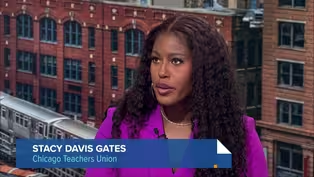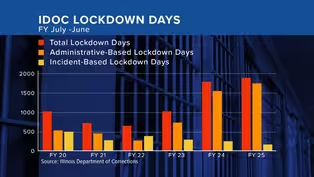Chicago Tonight: Black Voices
Illinois' SNAP Education Program Eliminated Due to Federal Cuts
Clip: 8/20/2025 | 7m 41sVideo has Closed Captions
The so-called "Big Beautiful Bill" aims to cut $287 billion from SNAP benefits.
The program reached more than 1 million Illinois residents and worked with 1,800 organizations.
Problems playing video? | Closed Captioning Feedback
Problems playing video? | Closed Captioning Feedback
Chicago Tonight: Black Voices is a local public television program presented by WTTW
Chicago Tonight: Black Voices
Illinois' SNAP Education Program Eliminated Due to Federal Cuts
Clip: 8/20/2025 | 7m 41sVideo has Closed Captions
The program reached more than 1 million Illinois residents and worked with 1,800 organizations.
Problems playing video? | Closed Captioning Feedback
How to Watch Chicago Tonight: Black Voices
Chicago Tonight: Black Voices is available to stream on pbs.org and the free PBS App, available on iPhone, Apple TV, Android TV, Android smartphones, Amazon Fire TV, Amazon Fire Tablet, Roku, Samsung Smart TV, and Vizio.
Providing Support for PBS.org
Learn Moreabout PBS online sponsorshipIllinois residents have benefited from an educational program that teaches SNAP recipients about nutrition.
But since the Trump administration's massive budget bill cut 287 billion dollars in SNAP benefits, formerly known as food stamps.
The program known as Snap.
Ed is coming to an end after 30 years.
Joining us now with more on the local impact, our Daylin Duffel Meyer, director of the Chicago Partnership for Health Promotion at the University of Illinois.
Chicago Demetria Adams.
Nutrition specialist of the Chicago Partnership for Health Promotion at the University of Illinois, Chicago.
Thanks to both for joining us.
Thanks for having a mix.
So Dylan, first one tell me how this program works.
Please.
>> So we get money from the federal government passes through the state goes to the University Illinois system and then it's split between extension, which is house in Urbana, Champaign.
And then you I see which is at our office, the office to commit engagement, neighborhood, health partnerships, and we focus exclusively on the city of Chicago where we deliver nutrition education to anybody who's eligible for SNAP benefits.
So any federally means tested program.
If you're eligible, you're eligible services.
We work doesn't matter the age or the location.
We we do contrition, education, physical activity, healthy lifestyle, trouble.
Was that helpful?
Was it useful for folks who are receiving snap benefits?
It's good.
It's good question.
So when idea is that if you're getting money from taxpayers had that you should be has had kind of mindful and efficient with that spending.
So, you know, there's no waste, fraud or abuse.
You know something like that.
our program, we people stretch their dollars as far as they can through the different activities cooking at home meal, planning prep shopping.
>> you know, grocery store planning, you know, that kind of things.
So we helped people spend their dollars wisely.
And that's the out and making healthier choices I make helpful to wake up to sure you tell us about your role in the program.
What you do.
>> Ok, I'm a nutrition.
Peer educator.
I go out and the community, the community I serve as the Roseland and Pullman community.
What I do I go out and I teach.
Nutrition education and also physical activities.
seniors, churches, libraries, promise market Pomona.
The classes that we teach.
I do 2 different time to come this one.
I'm going in the community.
One is create better help.
And in that not only teach nutrition education physical activity, but I also I do a cooking demo?
And in that demo, what create help they get a sample.
Now, the other missed that I teach cooking matters.
And that plan is.
They get take the full meal home, cook, the meal that I prepared before They can do that at home based on current learned in your class.
What kind of misconceptions do you hear from folks when it comes to cooking and nutrition?
Facts?
>> Well, one of misconception I just dealt with week was one of my clients, the Senate that they want to go back in star cooking with lard.
And that's not a healthy choice.
And I had break it down to a big client.
Why it's not a healthy choice and because a bit if you cooking or that this high before you cook it, when you ingest it, when think it's going it's going to Daniel honorees are going going to get caught up.
>> All right.
So so important like nutritional lessons like that, yeah, not only that but physical activity part as well because you can eat well all day.
But you also have to be physically active as well.
>> Some movement better than no movement.
They How will the program's the loss of funding?
How will that impact the work that you do?
The food access advocacy work?
>> So it's a great question.
That's one of the biggest challenges is is the access component.
You know, we can teach nutrition education all day long, but if families can access the foods or access the resources they need to engage in the knowledge that they've just learned.
It's it's kind of a work for not.
And one of our big programs are one of our new or innovative programs is our top box meal Kit project where we're able to kind of get around the axis issued by having meals delivered directly to people's homes.
We we think this is one of the first projects in the country that actually allows people to use their EBT card to link in Illinois to purchase meals and have been delivered directly to their home again, not having to do, you know, massive investments and, you know, grocery store infrastructure and things like that.
But sewing the issue immediately.
And with how are, you know, funding cut?
It's it's a big deal.
We won't be able to support this project and provide the wrap around services that, you know, help people actually take advantage of this project, which is the recipes, the nutrition facts, labels, things like that and helping top box.
You know Dawn on, you know what to do next.
>> The as we discuss, you know, the Republican led House Committee on agriculture claim that the snap and program yielded no meaningful change called it a waste of taxpayers.
Money.
Dimitri, I'm gonna come to you on this one.
First, how have you seen this program?
You know, personally affect people's lives.
The people who receive the services benefit one of the things it is the clients they want this program.
>> You know, they have not been introduced to program until we came along.
And now that this going to be cut from it, they don't have that access.
They don't have the knowledge of how to eat.
Well, how to be healthy and also had to be physically active.
>> same question to you like how have you seen this impacts people in and what are your concerns?
So one of the things that I'm particularly proud of with our program, you know, that there's a lot of focus on individual people's transformation.
>> You know, somebody lost a bunch of pounds are they're cooking more at home.
Things like that.
That's wonderful.
But the thing that I'm most proud of is our work also with the institutions that are taking care of the people.
All right.
So this is your Chicago public schools.
This is Chicago Park district.
These are your local groups like the great Off Aggression Development Corporation, you know, and we work with these groups to help them adopt a culture of wellness, a culture of health.
And so.
Those are the things that I'm most proud of.
And I really want to challenge this notion of it being a wasteful program or something that doesn't yield benefits because the the things that we do behind the scenes pay dividends for the future, right?
You know, sometimes when you plant a seed for a tree, you may not experience the shade that the tree have provides in the future.
But that doesn't mean that the work is not valuable.
that's where we stand.
We stand.
We think that we make an investment now in the communities that we live in, that we work in that we play in and that it will pay off in the future with a healthier healthy children next generation that that's a very
CTU President Stacy Davis Gates on District's Budget Deficit
Video has Closed Captions
Clip: 8/20/2025 | 9m 22s | Chicago Public Schools students returned to school this week, but a budget cloud hovers. (9m 22s)
What Happens During a Prison Lockdown? We Asked Incarcerated People
Video has Closed Captions
Clip: 8/20/2025 | 2m 29s | The Illinois Department of Corrections is seeing a 5-year high number of lockdowns in the state. (2m 29s)
Providing Support for PBS.org
Learn Moreabout PBS online sponsorship
- News and Public Affairs

Top journalists deliver compelling original analysis of the hour's headlines.

- News and Public Affairs

FRONTLINE is investigative journalism that questions, explains and changes our world.












Support for PBS provided by:
Chicago Tonight: Black Voices is a local public television program presented by WTTW

